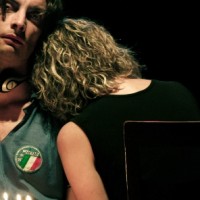ven. 25 aprile h.21
Berardi/Casolari IN FONDO AGLI OCCHI
di e con Gianfranco Berardi Gabriella Casolari, regia César Brie
luci e audio Andrea Bracconi , elementi scenici Franco Casini Roberto Spinaci
collaborazione musicale Giancarlo Pagliara, con il sostegno di Teatro Stabile di Calabria
In fondo agli occhi è uno spettacolo di nuova drammaturgia che affronta le tematiche della crisi e della malattia da questa prodotta e derivata. L’indagine parte e si sviluppa da due differenti punti di vista: uno reale, in cui la cecità, malattia fisica, diventa filtro speciale attraverso cui analizzare il contemporaneo, e l’altro metaforico, in cui la cecità è la condizione di un intero Paese rabbioso e smarrito che brancola nel buio alla ricerca di una via d’uscita. Chi è più cieco di chi vive, senza avere un sogno, una prospettiva davanti a sé, di chi essendone consapevole, non può far altro che cedere alla disperazione? Un paese cos’è in fondo se non le persone che al suo interno vivono e si muovono?
